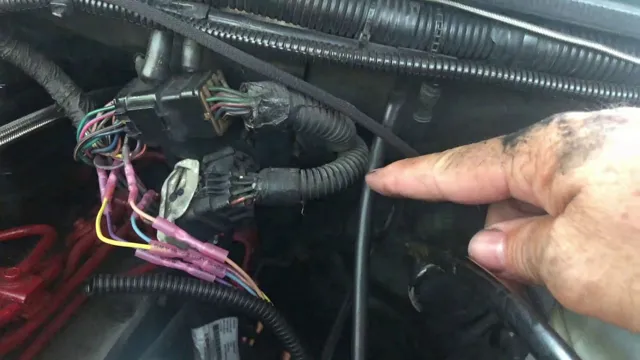Do you find that your air conditioning unit is only blowing cold air at night, but not during the day? This can be a frustrating experience, especially during those hot summer months when you need your AC to function properly. But why is this happening? There are actually several reasons why your AC may only be blowing cold air at night, and understanding these reasons can help you troubleshoot the issue and potentially avoid costly repairs. In this blog, we’ll dive into the potential causes of why your AC only blows cold air at night and what you can do to fix it.
So, let’s get started and beat the heat!
Understanding Your AC System
Having an air conditioning (AC) unit that only blows cold air at night can be quite puzzling. While it may seem odd, this phenomenon can be attributed to a variety of factors. Firstly, the temperature outside tends to be cooler at night, allowing your AC to work more efficiently.
If your indoor unit is located in an area where heat is generated during the day, such as near a window or electronics, this can cause the AC to struggle to keep up with the demand during the daytime, resulting in warm air being blown out instead. Additionally, your AC unit may need maintenance, such as a cleaning or refrigerant recharge, in order to function properly. Regular upkeep is essential to ensure your AC stays in optimal condition and runs smoothly all year round.
If you’re experiencing this issue frequently or notice other irregularities, it’s important to consult a professional to assess the problem.
AC System Basics
Understanding Your AC System As summer heats up, it’s important to understand how your AC system works. Your AC system has two main components, the indoor air handler and the outdoor compressor unit. The indoor air handler contains the evaporator coil that cools down the air and a fan that circulates it through your home.
The outdoor compressor unit has a condenser coil that releases the heat extracted from your indoor air and a fan that blows hot air away from the coil. Together, these two components work to create a cool and comfortable indoor environment. To maintain efficient operation and prevent breakdowns, it’s essential to change your air filter regularly, keep the outdoor unit free of debris, and have your system serviced annually by a licensed technician.
By understanding the basics of your AC system, you can keep it running smoothly and enjoy a comfortable summer season.

How Your AC Cools Your Home
Understanding how your AC cools your home is essential for proper maintenance and to ensure its maximum efficiency. Your AC System works by using a refrigerant that passes through evaporator coils, absorbing heat from the indoor air, and turning it into a gas. The gas then moves outside to the condenser unit, where it releases the absorbed heat and turns back into a liquid.
This cycle repeats continuously until the desired temperature is reached and maintained. Your air conditioner relies on several components, including the compressor, evaporator, fan, and refrigerant, all working together to provide your home with cool and comfortable air. Proper AC maintenance, including regular filter replacements, cleaning, and professional tune-ups, can help prolong your system’s lifespan and keep it operating at optimal efficiency.
Why Cold Air Only at Night?
Have you ever noticed that your AC only seems to blow cold air at night? While it may seem like a mystery, there’s actually a scientific explanation for why this happens. During the daytime, the sun is out and temperatures are typically warmer, causing your home to absorb heat from the surrounding environment. This makes it more difficult for your AC to cool down the air.
However, at night, the temperature drops and your home has a chance to cool down, making it easier for your AC to regulate the temperature and blow cold air. So, while it may seem like your AC is being selective with when it wants to cool your home, it’s actually just reacting to the temperature changes in your environment. It’s important to note that if your AC is only blowing cold air at night and not during the day, there may be an issue with your unit that needs to be addressed by a professional.
Temperature Changes in Different Climates
When it comes to understanding why cold air only appears at night, it all comes down to how different climates experience temperature changes. In areas where the temperature gets significantly colder at night, it’s due to radiational cooling. During the day, the sun’s warmth heats up the surface of the Earth, which in turn warms up the air around it.
But as the Earth cools down during the night, that warmth from the surface radiates outward into the upper atmosphere, leaving behind colder air closer to the ground. This is why some climates can experience drastic drops in temperature between night and day. However, in other climates where temperatures are more consistent, this radiational cooling effect may not be as noticeable.
So, to understand why cold air only appears at night, we have to consider the specific climate and weather patterns in that area.
Humidity and Its Effect on Your AC System
Humidity, Cold Air, AC System Have you ever noticed that your AC system produces cold air only at night? Well, one of the reasons behind this phenomenon could be the humidity levels. Humidity is the amount of moisture present in the air, and high humidity levels make it difficult for the AC system to cool the room. When the air inside your room is humid, it can hold more heat, making it challenging for the AC system to cool it down.
This is why you may be experiencing warm air during the daytime when the humidity levels are usually higher, and cold air during the night when the humidity levels drop. To combat this issue, you can invest in a dehumidifier that removes excess moisture from the air and enhances the performance of your AC system. Installing ceiling fans can also improve air circulation and help in cooling your room.
So, the next time you wonder why your AC system produces cold air only at night, keep in mind the influence of humidity levels on your system.
The Importance of Regular Maintenance
Regular HVAC maintenance is essential to keep your system functioning properly and to avoid any potential problems that could arise. One issue that many homeowners experience is cold air blowing only at night. This could be caused by a dirty air filter, which restricts airflow and causes the evaporator coil to freeze.
Another possibility could be a malfunctioning thermostat or a refrigerant leak. You may also want to check the ductwork for any leaks or damage. Regular maintenance, such as changing the air filter and scheduling professional check-ups, can help prevent these issues from occurring in the first place.
Don’t let a simple issue like cold air blowing only at night turn into a bigger problem. Keep up with regular maintenance to ensure the comfort and efficiency of your HVAC system.
Troubleshooting Your AC System
If your AC system only blows cold air at night, there could be several reasons for this. First and foremost, the temperature drop at night could be providing your AC system with the ideal conditions for optimal performance. However, if you’re experiencing inconsistencies in your AC system’s performance, there might be underlying issues that you need to address.
Some possible causes could include a dirty air filter, refrigerant leaks, faulty thermostat, or issues with the condensate drain line. It’s essential to have a professional HVAC technician inspect and diagnose your AC system to identify and address any issues that may be affecting its performance. A well-maintained AC system will not only deliver efficient cooling but also save you money on energy bills in the long run.
Therefore, don’t let a seemingly minor problem escalate into a significant issue. Contact an experienced HVAC technician today to schedule an appointment and keep your home cool and comfortable year-round.
Checking Your Air Filters
Checking Your Air Filters is an essential part of troubleshooting your AC system. One of the common reasons why your AC system is not working correctly is a clogged or dirty air filter. The air filter plays a crucial role in trapping dust, dirt, and other pollutants, ensuring that the air circulating in your home is clean and safe to breathe.
Over time, these particles block the air filter, causing reduced airflow and increased strain on your AC system, ultimately leading to failure. Checking your air filter is a simple task that you can do yourself by removing the filter and checking it visually. If it looks dirty or dusty, it’s time to replace it.
When selecting a new filter, consider the MERV rating, which measures the filter’s efficiency in capturing microscopic particles. A higher MERV rating means a more effective filter. It’s important to check your air filters regularly to ensure your AC system operates efficiently, avoiding costly repairs and improving the air quality in your home.
Inspecting Your Thermostat Settings
When your AC system doesn’t seem to be working properly, it’s important to start troubleshooting the problem in order to identify the root cause. One common issue that could be affecting your system is an improperly configured thermostat. Checking your thermostat settings is an easy process that can be done before calling in a professional.
Start by making sure the thermostat is set to the cooling setting and that the temperature is set lower than the current room temperature. If the thermostat is battery operated, make sure the batteries are not dead. You can also try cleaning the interior components to ensure that there is no dust blocking the controls.
By taking these simple steps, you may be able to save yourself a repair bill and have your home feeling cool and comfortable again in no time.
Conclusion
One might think their car’s AC unit has a secret fondness for the cooler temperatures of the evening, as it only decides to blow cold air when the sun goes down. But alas, the real reason for this phenomenon lies in the law of thermodynamics – as the temperature outside decreases, so does the load on the AC unit, allowing it to perform more efficiently. So the next time you’re enjoying a refreshing breeze from your car’s AC late at night, just remember that it’s not playing favorites – it’s simply following the rules of science.
“
FAQs
Why does my AC only blow cold air at night?
This could be due to cooler outdoor temperatures during the night, causing your AC unit to work more efficiently and produce colder air. Alternatively, it could indicate a problem with the AC system that requires a professional inspection.
Can I fix my AC to blow cold air during the day as well?
It depends on the cause of the issue. If it is due to outdoor temperatures, there may not be much you can do. However, if it is a problem with the AC system, a professional technician can diagnose and repair the issue.
How can I ensure my AC blows cold air consistently?
Regular maintenance, such as cleaning or replacing air filters and scheduling annual tune-ups, can help ensure your AC system is running efficiently and producing consistent cool air.
Could my AC blowing cold air only at night be a sign of a larger problem?
It’s possible. If you notice any other issues with your AC, such as strange noises or a decrease in air flow, it is important to have a professional inspect your system to identify and address any underlying issues.

